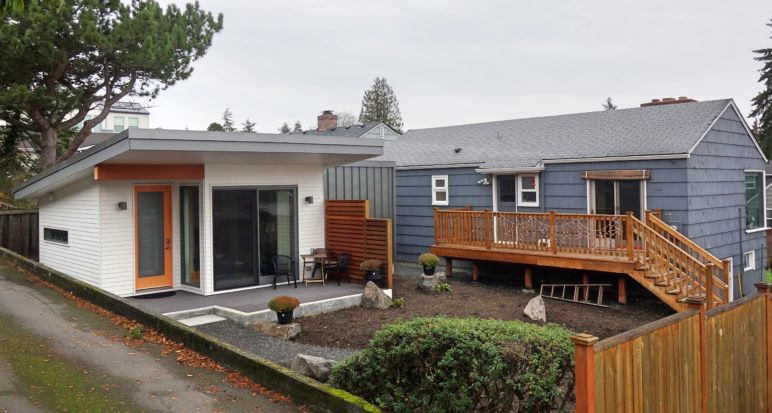Adding an ADU (auxiliary dwelling unit) to your property can seem like a great way to add space and expand your home. While there are definitely benefits to getting an ADU, it’s important to note that building one doesn’t come without a few drawbacks. In this article, we will take a look at the downsides of adding an ADU in Maryland and Washington DC. From permit costs and design restrictions — to underutilizing the available space — read on as we detail all of the pitfalls you should consider before making this investment in your home.
 Understand the various legal requirements when obtaining an accessory dwelling unit (ADU)
Understand the various legal requirements when obtaining an accessory dwelling unit (ADU)
Obtaining an accessory dwelling unit (ADU) can be a great way to add additional living space to your property. However, it is important to consider the legal requirements that come along with this process. Depending on the location and jurisdiction, there may be certain zoning regulations or building codes that must be followed when constructing an ADU. Additionally, it is important to comply with any permit or licensing requirements before beginning the construction process. Failing to follow these regulations could result in costly fines or legal trouble down the road. By understanding and adhering to the legal requirements associated with ADUs, homeowners can safely and legally add additional living space to their property.
Consider the impact of an ADU on your lot size, home value, and neighborhood
An Accessory Dwelling Unit (ADU) can have a significant impact on your lot size, home value, and neighborhood. It provides an opportunity to increase the livable space on your property and potentially generate rental income. However, there are several factors to consider before making this investment. Building an ADU requires careful planning and adherence to zoning regulations, which may vary depending on your location. A poorly planned ADU may not add value to your property and could potentially detract from the aesthetics of your neighborhood. On the other hand, a well-designed ADU can enhance your home’s value and provide much-needed housing options in the community. Therefore, it is essential that you consult with a professional before embarking on this project.
Evaluate the financial costs associated with building an ADU
As a homeowner, considering the financial costs associated with building an Accessory Dwelling Unit (ADU) is crucial. This accessory structure can generate additional income, provide housing for family members or renters and also increase the overall value of your property. However, it’s important to factor in a variety of expenses, including construction costs, permits, fees, and other miscellaneous costs. Typically, a homeowner can expect to pay anywhere between $80,000 to $125,000 for a new ADU construction project. While this may seem like a hefty price tag at first, it’s essential to remember that any investment in a property can result in long-term financial benefits. Hiring a professional contractor and conducting thorough research beforehand can also help minimize costs and maximize ROI.
Be aware of zoning regulations that could limit your ability to build an ADU
When building an accessory dwelling unit (ADU), it is vitally important to be aware of the zoning regulations that may apply to your property. Zoning regulations are put in place to ensure that residential properties are developed in a safe and orderly way. They dictate what types of structures can be built, where they can be located on the property, and what types of uses are permitted. Failure to comply with zoning regulations can result in fines and even legal action. As a responsible property owner, it is your duty to research and understands the zoning regulations that apply to your property before embarking on any building project. By doing so, you can avoid costly mistakes and ensure that your ADU is built to the highest standards of safety and quality.
 Consider any potentially hazardous materials found on the property before you begin construction
Consider any potentially hazardous materials found on the property before you begin construction
It is crucial to consider any potentially hazardous materials found on the property before beginning any construction work. These materials can range from asbestos-containing materials to lead-based paint or even mold. Failure to properly identify and handle these materials can not only pose a danger to the workers on-site but also to the future occupants of the building. Therefore, it is important to conduct thorough inspections and follow all appropriate regulations to ensure a safe and successful construction project. By taking these necessary precautions, you can protect both yourself and those impacted by the project from the harmful effects of hazardous materials.
Understand your responsibilities as a landlord if you decide to rent out an ADU in Maryland or Washington DC
Renting out an accessory dwelling unit (ADU) can be a great way to supplement your income, but it’s important to understand the responsibilities that come with being a landlord in Maryland or Washington DC. As a landlord, you have an obligation to provide safe and habitable living conditions for your tenants, and you must comply with local laws and regulations regarding rental properties. This includes things like ensuring that your ADU is up to code, maintaining proper insurance coverage, and handling repairs and maintenance promptly. Additionally, you must be prepared to handle any disputes or issues that may arise with your tenants, such as disputes over rent payments or property damage. By understanding your duties as a landlord, you can help ensure a positive experience for both yourself and your tenants.
Building an ADU can be a great way to maximize the use of your property, add value to your home, and even offer additional revenue potential. However, it’s important to consider the various legal requirements involved in obtaining an ADU, its impact on your lot size, home value, and neighborhood, as well as evaluate the financial costs associated with building an ADU. Additionally, it’s critical to examine zoning regulations that could limit your ability to build an ADU and any hazardous materials that may be present on the property before you start construction. Finally, if you decide to rent out your ADU in either Maryland or Washington DC then you must understand your state-specific responsibilities as a landlord. Working with a qualified design-build firm like Winthorpe Design and Build can help make sure all of these elements are addressed during planning so that construction is successful and meets all local ordinances. Now that you have a better understanding of what an accessory dwelling unit is and how to proceed in undertaking such a project, why not give us a call today for assistance with those home improvement plans?



 Consider any potentially hazardous materials found on the property before you begin construction
Consider any potentially hazardous materials found on the property before you begin construction

